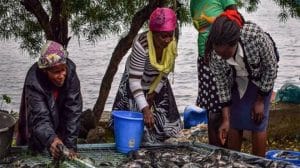Profitability and knowledge gaps in fish farming are two critical areas where the Integrated Aquaculture-Agriculture Management (IAAM) project must focus on for success.
That’s the message fish farmers from Malawi told Agricultural Extension Development Officers (AEDOs) during recent training sessions. These sessions are the first step towards developing a census for fish farmers, which will capture essential data on the number of fish farms, existing and potential farmers, and their locations.
The IAAM project aims to combat food insecurity by increasing the productivity and income of, and access to markets by, small-scale food producers, especially women, engaged in integrated aquaculture-agriculture systems comprising of fish, crops, livestock and agroforestry.
“There are a lot of fish farmers in the communities but they do not have capacity to make fishing a profitable business,” one farmer said during a training session.

Women collecting the fish they’ve harvested. To combat food insecurity in Malawi, CDF Canada has partnered with the governments of Malawi and Norway, along with local partners, to increase small scale producer’s access to markets, productivity and income.
Participants also expressed concerns about the absence of support from government officials in developing training materials, which prevents farmers from learning more about aquaculture practices.
“There is lack of capacity and knowledge among farmers and extension workers. Most extension workers are familiar with crop extension services and not fish farming,” one participant said.
To support fish farmers, the project is adapting the latest technology to gather essential information. Using the Kobo interface, AEDOs collected data on more than 3,100 farmers and their fishponds. Findings reveal that the average age of fish farmers surveyed is 48, with an average pond size of 348 square metres. Notably, 69 per cent of respondents have stocked fish in the past five years while 31 per cent have not stocked their ponds since 2020 and six per cent have never stocked their ponds.
AEDOs and District Fisheries Officers will use this data as a starting point to develop economically sound and environmentally friendly small scale, low-cost aquaculture production systems. As well, the data will help tackle challenges related to fish feed and fingerling supply.
“Feed is sold at a very high prices and it is hard to find in the local areas,” a fish farmer said.
Using a data-centric approach will also strengthen the role of agricultural and aquacultural small-scale producers and small-and-medium sized enterprises within value chains. Other aspects of the project include having a gender-responsive approach, which recognizes the equitable participation of women in co-operatives. Furthermore, efforts will be made to improve forest cover in both farm and non-farming communities by expanding and improving village forests and woodlots.
The project, a collaboration between the Co-operative Development Foundation of Canada, the governments of Malawi and Norway and local partners, will run until 2028, directly benefiting 7,200 households.